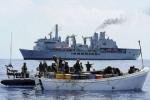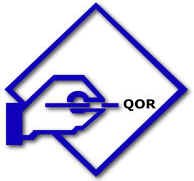Alexander MEZYAEV | 02.12.2012 | 00:00
 The UN Security Council has returned to the problem of pirates. On November 19 a new report by the UN General Secretary on piracy was discussed, and on 21 November a new Security Council resolution was adopted, which established a number of very interesting provisions.
The UN Security Council has returned to the problem of pirates. On November 19 a new report by the UN General Secretary on piracy was discussed, and on 21 November a new Security Council resolution was adopted, which established a number of very interesting provisions.
Marine transportation accounts for 90% of all international trade transportation in the world, so therefore piracy has become a threat to world trade. In the first 10 months of 2012, 291 attacks have been made on ships. (1) Pirates are still holding 293 sailors hostage. As in 2011, and in 2010, the most vulnerable areas to this hazard are East Africa, West Africa and the Far East.
If you compare the new report of the UN Secretary General on piracy with the previous one, you can see that the number of pirate attacks in the waters off the coast of Somalia in 2012 compared to 2011 decreased markedly. So, for the first nine months of 2012 in the waters off the coast of Somalia 99 attacks on ships were made, resulting in the capture of 13 ships. Most attacks ending in the hijacking of ships occurred in the western Indian Ocean. During the same period in 2011, 269 attacks were committed and 30 vessels seized. (2) At the end of September 2012, 224 sailors were being held hostage and 17 vessels were held captive (in September 2011, 339 people were held hostage and 16 vessels were held captive).
While piracy is a worldwide problem, it takes different forms. Off the coast of Somalia, pirates capture ships and their crews for ransom. According to the UN Office on Drugs and Crime, in 2011, Somali pirates received a ransom for the stolen ships and their crew of about $170 million ($ 110 million in 2010). Some portion of the money went into the legitimate financial system. (3) The average size of ransom to pirates in 2011 was about $5 million. The laundering of the proceeds of piracy has led to a sharp increase in commodity prices in the Horn of Africa and neighboring countries. Part of this income goes back into criminal channels, including activities related to drug trafficking, smuggling of weapons and alcohol trafficking.
Apart from the already widely known Somali pirates, recently a new entity has appeared – pirates in the Gulf of Guinea. If in 2012 the number of acts of maritime piracy off the coast of Somalia has decreased, piracy in the Gulf of Guinea, on the contrary, is gaining momentum: in 2012, 34 attacks were recorded (data for January – September), that is 4 more attacks than in the same period last year. Here the pirates are mainly engaged in stealing oil, related to the regional black market and to organized crime. Despite the hostage taking, the ransom is an «incidental». In the Gulf of Guinea, armed robbery mainly occurs slightly off shore. The Problem of piracy in the Gulf of Guinea cannot be solved in the same manner as in the Gulf of Aden and off the Somali coast, as on the shores of the Gulf of Guinea, the problem appears different, particularly in view of the fact that there is no failed state or a strategic sea route involved. Pirate income from intercepting oil is used to fund networks that seek to undermine state authority. The impact of piracy on the economy of some countries, particularly in the Gulf of Guinea, is clear, especially given the fact that port charges in these countries make up a significant portion of their national income. For example, the Republic of Benin, which continues to suffer most from frequent pirate attacks, has been experiencing in the last two years a catastrophic decline in activity in the port of Cotonou, and the volume of Benin sea transport has declined by 70%. (4) The country is suffering huge financial losses, due to the catastrophic impact of piracy on the financial security of the countries in this region. Just because of piracy West African countries lose about U.S. $ 2 billion annually. (5)
What is the concept behind the fight against piracy, as proposed by the UN Secretary General in his report? It lies in the fact that despite the importance of prosecuting ordinary common pirates, the goal is to identify and neutralize the key figures in the pirate industry, «The effective solution would be to strike at the heart of piracy. Without leaders and financial intermediaries the pirate business model would fall apart. To address this issue will require a legal framework for combating corruption and financial irregularities, including money laundering. We therefore advocate the imposition of targeted sanctions against the leaders of the pirates».
So far, the main way to combat piracy is a military presence in a number of states in the Somalia area. The main force consists of three specialized marine operations (the European Union, NATO and Allied Naval Forces (6)), and vessels of several Member States, as authorized by the UN Security Council in 2011. Three teams of these task forces function in rotation as focal points for the Gulf of Aden and the Somali Basin. The Russian Federation also has a military presence in the Gulf (7).
Of particular note is the problem of the plundering of natural resources in the coastal waters of Somalia, on the one hand, and the illegal dumping of waste, including toxic substances on the other. The UN Secretary-General in his report very awkwardly avoided this side of the case, saying that he had no such information, for which he blamed «lack of adequate monitoring and reporting». (8) The General Secretary said that the discharge of toxic substances may have occurred, but that happened «a few years ago», and now, they say, «there is no evidence of such activity».
There is yet another problem. UN Security Council Resolution № 2077 of November 21 urged Somalia to establish an exclusive economic zone (EEZ) (9). Under international maritime law, such a zone can be extended to up to 200 nautical miles from the coast of Somalia. But just because the state of Somalia does not declare such a zone does not mean that other states can implement the illegal exploitation of natural resources of the area and the dumping of waste there (10). Then why demand a declaration from Somalia? The fact is that Somalia has long proclaimed its territorial waters to be 200 nautical miles from its coastline (11)! And that is quite a different legal situation! If the EEZ is an area with a mixed situation (with a priority of international law over domestic law), then the territorial sea is state territory! Thus, the point of the resolution 2077 is essentially an attempt to make Somalia change the legal situation of its state territory, as the UN Convention on the Law of the Sea recognizes the territorial waters as only within 12 miles of the coast!
Piracy off the coast of Somalia occurs for a range of reasons, but the resolution adopted by the UN Security Council is not eliminating any of them. Despite the fact that officially the main reason is the complete destruction of the state of Somalia, there are more compelling reasons. Namely, the desire of some countries to use this situation to their advantage. The UN Security Council meeting on November 21 was convened by India and based on a conceptual note. It notes a very important fact: the UN Security Council is attempting to address the issue of piracy in a «distinctly regional key» at this time, when it should be considered only in a global context. (12) In the meantime this approach, proposed by India, remains unrealized. And no wonder. As it turns out, even in the UN Security Council there are patrons of pirates: the representative of the Russian Federation, Vitaly Churkin, said bluntly that the proposal to impose sanctions on the pirate leaders «does not find support from some members of the Security Council». (13)
(1) Data International Maritime Organization (IMO) – см.: http://www.imo.org
(2) Report of the Secretary-General pursuant to Security Council Resolution 2020 (2011) of 22 October 2012 / / UN document: S/2012/783. C.1
(3) Same.
(4) See the statement by the representative of the Republic of Benin to the United Nations Security Council November 19, 2012, / / UN document: S/PV.6865. C.14.
(5) In October 2011 and in February 2012, the UN Security Council adopted two resolutions, which first raised the issue of piracy in the Gulf of Guinea (see UN Doc: S/RES/2018 (2011) and S/RES/2039 (2012).
(6) The combined naval forces, which include 27 states, conduct security operations at sea and combat piracy. Operations forces to combat piracy are carried out by the Combined Task Force 151, and Combined Task Group 150 and 152 conduct security operations at sea and contribute to the strengthening of regional capacity. In 2012, the command of the group 151 rotated between Denmark, Pakistan, Republic of Korea and Thailand.
(7) Speaking on November 19 in the UN Security Council V.Churkin said: «We intend to continue to support the presence of naval forces in the Gulf of Aden, working in close coordination with other countries and regional organizations». (See: UN: S/PV.6865. C.6).
(8) See document UN: S/2011/661.
(9) Paragraph 4 of the resolution states that the Security Council «refers to the Somali authorities to request … to announce the establishment of an exclusive economic zone in accordance with the UN Convention on the Law of the Sea».
(10) Thus, the representative of South Africa to the UN Security Council Meeting November 21, 2012 stated that the «Convention on the Law says nothing about the existence of the EEZ depending on its announcement by the coastal State» (UN Doc: S/PV.6867, with .3).
(11) The situation is rare, but not unique. Besides Somalia 200-mile territorial waters have been declared by seven more countries: Benin, Congo, Ecuador, El Salvador, Liberia, Peru and Iceland.
(12) International peace and security: piracy. Concept note, / / UN document: S/2012/814 of 7 November 2012
(13) See the transcript of the UN Security Council meeting on November 19, 2012, / / UN document: S/PV.6865. C.6




































comment closed after 30 days / Jawaabaha waa la xiray ama waa la joojiyay wixii ka badan 30 cisho.